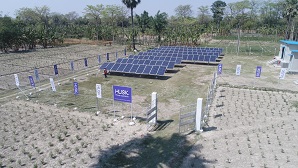Husk Power Systems (Husk), the leading minigrid company serving rural communities in Sub-Saharan Africa and South Asia, has secured a new round of equity investment totaling $43 million.
New investors include STOA, which led the round, the U.S. International Development Finance Corporation (DFC), and Proparco, with follow-on investments from existing shareholders including Swedfund and FMO. The funding will accelerate the rollout of minigrids in rural and peri-urban Nigeria and India, enabling increased access to clean, affordable, reliable, and modern energy.
Husk, a leading player in the minigrid space
Husk builds, owns and operates minigrids that help catalyze economic growth in rural India and Africa. The company has the largest fleet of community solar minigrids across the two continents, with 200 operational minigrids and aims to double its footprint in the next 12 months. Its innovative approach combines solar energy, batteries, and backup sources to ensure round-the-clock access to clean and affordable power for small businesses and households.
Since pioneering the community minigrid in 2008, Husk has expanded its business model to not only provide energy access but also facilitate the transition from fossil fuels to renewables. This evolution includes the sales and finance of energy efficient appliances, turnkey commercial and industrial (C&I) rooftop solar and a range of low-carbon and climate-resilient energy services, including agro-processing and irrigation. In 2022, thanks to its long-standing experience and excellent performances Husk turned its first profitable quarter in both Africa and Asia, with a positive Q4 EBITDA in its two primary markets Nigeria and India.
Beyond being one of the most successful minigrid companies, Husk has also long been an active leader striving to move the needle for the overall industry. In 2022, Husk published the first-ever Minigrid Industry Roadmap, providing a framework for scaling the industry to 200,000 minigrids.
In early 2023, the company launched a public-private partnership proposal in view of fast-tracking the deployment of minigrids in the Least Developed Countries. More recently, the company announced its ‘Africa Sunshot’ initiative, an ambitious plan to contribute to the achievement of universal energy access by 2030. This plan includes the goal to operate a fleet of 2,500 minigrids in off-grid and weak-grid communities in rural Sub-Saharan Africa.
The role of minigrids in achieving universal energy access
According to the International Energy Agency, more than 700 million people worldwide lack access to electricity, with the majority residing in Africa where the electrification rate of the 33 least developed countries is only 36%. Solar minigrids can play a significant role in improving energy inclusion. To meet the growing energy demand, it is estimated that a substantial number of new minigrids need to be built before the end of the decade. This significant investment push is supported by energy access programs funded by the World Bank and other donors, including in Husk’s core markets.
In Nigeria, 90 million people still live without access to electricity. With grid-extension not considered a near-term option, and diesel and petrol generators the usual, but expensive and polluting option for light and power, solar minigrids are key to enabling economic growth, increased employment and wealth creation.
In India, despite the country approaching 100% grid electrification, daily power cuts continue to impact around half of rural households and a third of urban households, hindering productivity and economic growth. In the northern states of Bihar and Uttar Pradesh, Husk’s minigrids allow rural businesses, schools and health clinics to access reliable, clean and affordable energy, thereby supporting growth and creating job opportunities.
“We are excited to have STOA lead this financing, which will enable us to fully deploy our AI-powered renewable energy platform in Sub-Saharan Africa and India, and unleash a rural industrial revolution. It is also a clear signal to governments and investors that the minigrid industry is fully bankable and ready for primetime.” Shared Manoj Sinha, Husk’s CEO.
“The mini-grid sector is key to achieving access to electricity for all and to accelerate the energy transition in rural areas. This is STOA’s first investment in the sector: we were impressed by the track-record and the performance of Husk that together result in a very competitive solution in terms of cost and reliability” explained Jean-Pierre Barral, Deputy CEO of STOA.
“This investment in Husk, which will fund the rollout of new minigrids in India, Nigeria and possibly other African countries, perfectly aligns with STOA’s mandate as an impact investor with a focus on emerging markets and climate change mitigation.”
Husk Power Systems design, builds, owns and operates the lowest cost hybrid power plant and distribution network in India and Africa, offering our customers a flexible ‘pay-as-you-go’ energy service, using a mobile-enabled smart metering system

